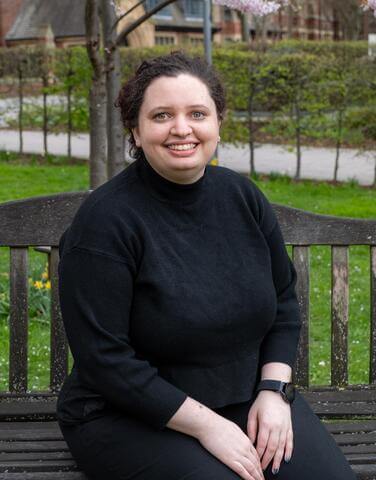Bison Trailblazers | Carrissa Anderson
by Anna De Cheke Qualls
Perhaps it was the ziggurats at the University of East Anglia that got alum Carrissa Anderson thinking about a PhD abroad. Or the city of Norwich's charm and serenity. Whatever the experiences during her year abroad in the United Kingdom (UK), they planted a seed for living and working overseas.
Now a doctoral student at the University of Leeds, Anderson relishes in her research and the global perspective that her location offers. Continuing from her Master's thesis at Howard, she is focused on the U.S. intelligence community during the 1950's. Through a secret spy program called Operation STAGE (located in Alaska), men were trained to gather intelligence in the event of a Soviet invasion of the Territory.
"I chose intelligence studies because I am interested in learning about the inner workings of our democracy and what the government tried to hide in the past," says Anderson.
Because the time-to-degree for doctoral programs in the U.K. is typically three years (compared to six in the U.S.), in 2022, Anderson was ready to move overseas. Even though the language was not a barrier, there was still an adjustment period.
"You lose the comfort of having familiar foods, currency, social behaviors, etc. when you are an immigrant. However, with the comradery of my cohort, particularly those who are from the same country as me, I have found that allowing yourself time to adjust tends to correct these issues. Also, keeping in touch with family and my best friend from Howard has kept me from feeling too misplaced," shares Anderson. "I am open to living anywhere in the world where I can find good employment. I am more critically considering whether to return to the States because of the current political climate, but would love to be close to my family again."
The length of the program isn't the only plus factor for Anderson. Studying at Leeds has helped her to take a less American-centric and more international perspective on her research. The University also has robust and accessible American and Intelligence History communities. While some of her research is online, Anderson has also traveled back to D.C.'s Truman and Eisenhower Libraries for archival research. Last year, she also had a chance to deliver a paper at the U.K.'s first National Intelligence History Conference at Bletchley Park - the home of Alan Turing and other U.K. code breakers during the Second World War.
"I’ve been excited to learn how tough the U.S. military found the idea of waging war in the Arctic to be. They conducted many scientific trials and simulations to find the right gear for cold weather (in case they had to fight in Siberia, Alaska, Canada, etc.)," says Anderson.
Before moving to the U.K., Anderson briefly participated in Howard University's internship program with the National Park Service for their project on the Underground Railroad, as well as the National Archives Foundation and the City of Alexandria's Visitor's Center. After earning her Master's, she was an adjunct associate professor at San Joaquin Delta College, where she taught African American, Women's and American History. Through all of these positions, she honed her communications, and teaching skills. Anderson believes that teaching made her a better researcher.
Beyond her academic work, Anderson has also been able to take advantage of travel within the region. Hailing from diverse Stockton, California, Anderson grew up among the Central Valley's famous fresh produce and different cultures. These factors motivated her to look beyond her city to explore the rest of the world. And she has certainly been able to do that while in the U.K.
"I would emphasize how much easier it is to travel here. Not only are cities more walkable (I do not feel the need to get an international driver's license), but the train system is also well-connected both within and outside of the U.K. This is a great motivator for those that really want to see the world but are unsure about relocating. You can gain so many great experiences from both short and long trips here," says Anderson. "I managed to travel through eleven different countries during my first study abroad year."
After finishing her doctorate, Anderson aims to make her research available for the general public.
"I hope to publish my research as books and articles that can be enjoyed by more than just other academics, and to be featured in historical documentaries. If I continue in academia, I would love to pay it forward by mentoring upcoming scholars on how to highlight those from the past who have been voiceless in addition to making their own voices heard," remarks Anderson.
She also has some parting advice.
"Don't underestimate what your connection to Howard can do for you. I was hired for my former teaching job at Delta College because of the skills and knowledge that I developed from the History Department. Also, don't be afraid to leave your comfort zone, whether it's professionally or geographically, because you never know what opportunities might be available to you."

